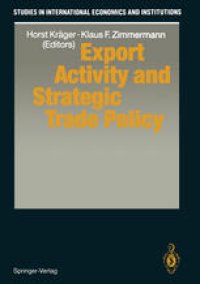
Ebook: Export Activity and Strategic Trade Policy
Author: Horst Kräger Klaus F. Zimmermann (auth.) Dr. Horst Kräger Professor Dr. Klaus F. Zimmermann (eds.)
- Tags: International Economics, Economic Theory, R & D/Technology Policy
- Series: Studies in International Economics and Institutions
- Year: 1992
- Publisher: Springer-Verlag Berlin Heidelberg
- Edition: 1
- Language: English
- pdf
New theories of international trade suggest that pro- tectionism can make sense. This finding depends on the in- troduction of market power and increasing returns to scale into the international trade theory. The enormous political implications of this hypothesis have started a large interest in applied or empirical investigations of this issue. However, econometric work in international trade is comparatively scarce, especially if it comes to testing with individual data. Therefore, this volume is considered to be a contribution to fill that gap. The volume consists of three parts: First, issues in strategic trade are discussed by means of a survey on recent contributions of the literatureand by a simulation excercise on optimal trade policy for imperfectly competitive industries. Second, a part investigating the determinants of trade flows studies the interrelationships between trade balances and exchange rates, plant size and international trade, and the revelance offirm size and market concentration for the degree of export market integration using business survey firm data. Third, there are studies on imperfect markets, innovations and learning which demonstrate the importanceof imperfect competition for international economics. All contributions provide empirical evidence for the revelance of the newly developed trade theories and demonstrate useful quantitative techniques for their investigation.
New theories of international trade suggest that pro- tectionism can make sense. This finding depends on the in- troduction of market power and increasing returns to scale into the international trade theory. The enormous political implications of this hypothesis have started a large interest in applied or empirical investigations of this issue. However, econometric work in international trade is comparatively scarce, especially if it comes to testing with individual data. Therefore, this volume is considered to be a contribution to fill that gap. The volume consists of three parts: First, issues in strategic trade are discussed by means of a survey on recent contributions of the literatureand by a simulation excercise on optimal trade policy for imperfectly competitive industries. Second, a part investigating the determinants of trade flows studies the interrelationships between trade balances and exchange rates, plant size and international trade, and the revelance offirm size and market concentration for the degree of export market integration using business survey firm data. Third, there are studies on imperfect markets, innovations and learning which demonstrate the importanceof imperfect competition for international economics. All contributions provide empirical evidence for the revelance of the newly developed trade theories and demonstrate useful quantitative techniques for their investigation.